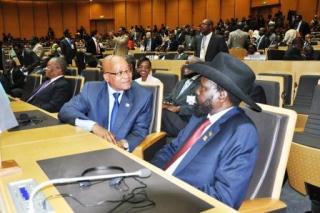Kiir explains South Sudan’s refusal to sign oil deal with Khartoum
February 1, 2012 (JUBA)- South Sudan president, Salva Kiir Mayradit, on Tuesday told fellow heads of state at the (AU) summit that his country refused to sign a proposed deal on oil with neighboring Sudan because the deal failed to comprehensively address the fundamental causes of the crisis.

The talks reportedly collapsed after Kiir refused to sign a deal proposed by mediators of the African Union High Level Panel (AUHIP) led by former South African President Thabo Mbeki.
If signed, the deal would have seen South Sudan reversing its decision to halt oil production in response to Khartoum’s sequestration of its crude, and the latter receiving from Juba $4 billion over the next five years as well as 35,000 barrels per day for the use of refineries.
Addressing the 18th AU Assembly, Kiir said the proposed agreement was “vague on several issues” and that the “transitional financial provisions were not in line with what we anticipated.”
He further explained that the deal “tied the Republic of South Sudan to urgently provide cash and oil to the government of Sudan without first addressing the issues that made us reach this point”.
The dispute over oil escalated as the two countries failed to agree on a fair charge to export oil produced by the landlocked South Sudan through Khartoum’s pipeline infrastructure to Port Sudan.
Khartoum, citing Juba’s failure to pay transit fees and lack of its will to reach an agreement, moved to confiscate South Sudan’s oil, saying it was only taking Sudan’s right.
Juba accused Khartoum of stealing oil revenues amounting to US$850 million. It later moved to shutdown oil production and explores options for transporting South Sudan’s oil through another route.
In his address, Kiir said South Sudan’s decision to halt oil production was prompted by Khartoum’s unilateral decision to enact a bill levying a fee of US$32.20 per barrel on South Sudan oil that passes through its territory.
According to the South Sudanese president, Khartoum-demanded fee is “completely out of international norms.”
Kiir said that the AU must understand that South Sudan had “no objection to paying Khartoum for the use of their infrastructure,” but only within bearable cost limits despite “the violation of the sovereignty of South Sudan.”
South Sudan seceded from Sudan under a 2005 peace deal that saw the two sides evenly splitting 500,000 barrels of oil produced from fields mainly located in South Sudan.
But South Sudan took with it over 75 percent of that production when it seceded in July last year, leaving Khartoum to struggle with an economic crisis.
“Khartoum began diverting and confiscating our oil by force. We acknowledge that most of the oil infrastructure lies on the territory of Sudan; however the oil clearly belongs to South Sudan. This unilateral decision to take our crude entitlements is unmistakably a violation of the sovereignty of South Sudan and must be condemned”, Kiir told the AU summit.
Kiir addressed Sudan’s claims that his country was not paying fees, saying Juba had been paying transit fees to oil companies but Khartoum wanted the fees to be paid directly to its treasury rather than to a third party.
He went on to accuse Khartoum of constructing a “tie-in pipeline designed to permanently divert almost 75percent of our daily entitlements,” saying that the move also aims to “coerce us into signing the cover agreement presented by the AUHIP.”
Kiir suggested that an agreement should have addressed outstanding issues of the Comprehensive Peace Agreement, including border issues and the status of the hotly contested region of Abyei.
Kiir further said that the issues of payment should be settled “through an independent transparent committee” made up of nominated committees from both countries and a third nominated by the AU. This committee would “audit and ensure that payments are transparently made,” he added.
Kiir returned from the summit to rapturous applause in Juba, South Sudan’s capital.
Stephen Dhieu Dau, South Sudan’s oil minister, on Wednesday confirmed that Khartoum has only released four oil tankers, which were the first to be detained in last December.
He said 600,000 barrels from the oil which the Sudanese government confiscated from entitlements belonging to his country were loaded onto ships belongs to Sudanese buyers on Tuesday.
“They are continuing to sell our oil to their buyers. They are still preventing our buyers whose ships were in the international waters to come and load our entitlements because they thought Sudanese government had released all what was confiscated”, Dau told Sudan Tribune.
(ST)
